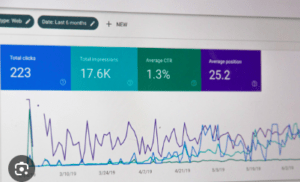97% of search engine users search online to find a local business. If users want to find a local business online, they turn to search engine users first.

Investing in local SEO is a smart move, but how do you know if your efforts are actually translating into more customers? Data is your answer! By tracking the right metrics, you can gain valuable insights to guide your strategy and ensure your local marketing dollars are well spent.
Key Metrics to Track for Local SEO
Google My Business Insights: This dashboard within your GMB profile is a treasure trove of data. Track how often you appear in searches, clicks to your website, requests for directions, phone calls, and more.
Website Analytics: Use platforms like Google Analytics to see how much of your website traffic is coming from organic search within your local area. Pay close attention to the keywords people are using to find you.
Rankings: Track your positions in both the local map pack and organic search results for your most important keywords. Many tools are available (like SEMrush or Moz Local) to help with this.
Reviews: The number of reviews, your average star rating, and how actively you respond all send signals about your business reputation – both to customers and search engines.
Backlinks: Track new links you’ve acquired from local websites, and the growth of your overall backlink profile. A healthy backlink profile indicates authority and relevance in your community.
Tools for Tracking Local SEO Progress
Google My Business Insights: Your starting point for essential GMB data.
Google Search Console: Gain insights into your website’s organic search performance, including clicks, impressions, and keywords driving traffic.
Rank Tracking Tools: There’s a range of options here (SEMrush, Moz Local, Whitespark, etc.). Choose one that fits your budget and lets you track the keywords and locations most important to your business.
Backlink Monitoring Tools: Tools like Ahrefs or Semrush help you see new backlinks you’ve gained and provide an overview of your backlink profile.
Mention Tracking: Set up alerts (Google Alerts is a simple option) to track mentions of your business name online, even if they don’t include a direct link. This helps you monitor your overall reputation.
Turning Data into Action
The goal isn’t just to collect numbers; it’s to use these insights for improvement! Here’s how:
Look for Trends: Are your GMB impressions increasing over time? Is website traffic from local keywords growing steadily? Track progress month over month to spot what’s working and what’s not.
Competitor Analysis: If possible, compare your metrics to similar businesses to identify areas where you can outshine your competition.
Pinpoint Weaknesses: Is your website getting local traffic, but few conversions? It might be time to revisit your on-page optimization. Lack of review responses could be impacting your GMB visibility.
Conclusion
Tracking your local SEO progress takes away the guesswork. By consistently monitoring key metrics, you’ll gain the clarity to make informed decisions, refine your strategy, and maximize the return on your local marketing efforts.
Don’t Let Competitors Outrank You – Schedule Your Strategy Call Now
Need help setting up local SEO tracking or understanding the insights your data reveals? Our “Local Competitive Advantage Package” includes comprehensive performance tracking and analysis, empowering you with the data you need to succeed. Contact us today!
Check out our last blog on:
The Power of Local Links: Boosting Your Website’s Authority in Your Community






